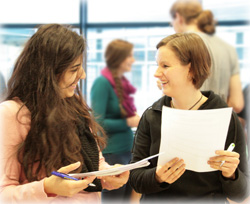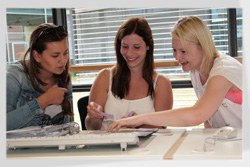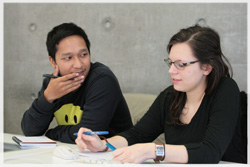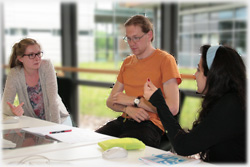 Time of the course: Tuesdays 17.45-19.15
Time of the course: Tuesdays 17.45-19.15
Students will set up a simulated company and communicate with institutions and individuals in different countries. The international project environment will enable the participants to learn about the workings of a company as well as to practice dealing with international project partners in a near-realistic situation. Students will be able to put their intercultural knowledge into practice in real contact with foreign partners in the preparation of a project meeting.
The topic this semester will be decided by the students.
 Time of the course: Thursdays 11:45-13:15 (changes to Thursdays 14.15-15.45 in second half semester)
Time of the course: Thursdays 11:45-13:15 (changes to Thursdays 14.15-15.45 in second half semester)
Students are trained to perceive cultural differences and act accordingly. The intercultural competence gained is both "culture-general" and "culture-specific" (e.g. students will practice culture-specific "crash investigations" in order to prepare visits abroad). Theoretical insights into different working styles, different perceptions of time, different religions, and different education styles are applied in exercises and in concrete simulations involving active interaction if possible with participants from several other cultures.
 Time of the course: Thursdays 10:00-11:30 (changes to Tuesdays 16.00-17.30 in second half semester)
Time of the course: Thursdays 10:00-11:30 (changes to Tuesdays 16.00-17.30 in second half semester)Students are trained to perceive cultural differences and act accordingly. The intercultural competence gained is both "culture-general" and "culture-specific" (e.g. students will practice culture-specific "crash investigations" in order to prepare visits abroad). Theoretical insights into different working styles, different perceptions of time, different religions, and different education styles are applied in exercises and in concrete simulations involving active interaction if possible with participants from several other cultures.
 Time of the course: Mondays 17:45-19:15 (changes to Tuesday 11.45-13.15 in second half semester)
Time of the course: Mondays 17:45-19:15 (changes to Tuesday 11.45-13.15 in second half semester)
Students are trained to perceive cultural differences and act accordingly. The intercultural competence gained is both "culture-general" and "culture-specific" (e.g. students will practice culture-specific "crash investigations" in order to prepare visits abroad). Theoretical insights into different working styles, different perceptions of time, different religions, and different education styles are applied in exercises and in concrete simulations involving active interaction if possible with participants from several other cultures.